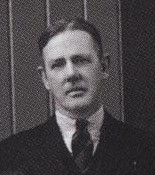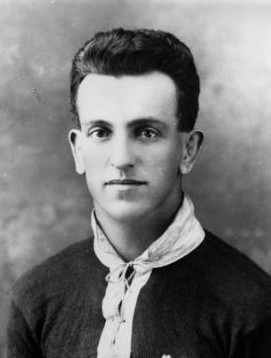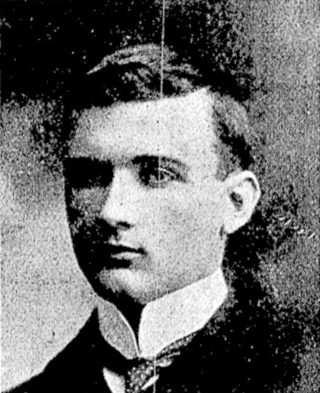Related Research Articles

The Queensland Rugby Football League (QRL) is the governing body for rugby league in Queensland. It is a member of the Australian Rugby League Commission and selects the members of the Queensland rugby league team.
The New Zealand Rugby League (NZRL) is the governing body for the sport of rugby league football in New Zealand. The NZRL was founded on 25 April 1910 in preparation for a tour of Great Britain that same year.

William Martin Kelly (1892–1975), born in Westport, New Zealand was a rugby league football identity who enjoyed success in New Zealand and Australia as both a player and coach in the first half of the 20th century. He played for Wellington, the Balmain Tigers, New South Wales and for both the New Zealand and Australian national sides. He also had a long coaching career with five different clubs in the NSWRFL in the 1920s, 1930s and 1940s, and with New Zealand in 1932.

Victor John Hey, also known by the nickname of "The Human Bullet", was an Australian rugby league national and state representative five-eighth and later a successful first-grade and national coach. His Australian club playing career commenced with the Western Suburbs Magpies, and concluded with the Parramatta Eels. In between he played for a number of clubs in the English first division. He is considered one of Australia's finest footballers of the 20th century

Dean Bell, also known by the nicknames of "Mean Dean", and "Deano", is a New Zealand former professional rugby league footballer, and coach. A New Zealand international representative centre, he played his club football in England, Australia and New Zealand, but most notably with Wigan, with whom he won seven consecutive Challenge Cup Finals, a Lance Todd Trophy, and a Man of Steel Award. He later coached English club Leeds for two seasons.

Duncan Fulton Thompson MBE was an Australian veteran of both WWI and WWII and a rugby league footballer, coach and administrator. He was wounded on active service in WWI and has been named amongst the nation's finest footballers of the 20th century, and is regarded as the father of modern coaching. He was appointed a Member of the Order of the British Empire (MBE) in the 1960 New Year Honours "for services to the community in the field of Sport."

"Jum" Hubert Sydney Turtill was a New Zealand dual-code footballer, playing rugby union and then rugby league for New Zealand. After emigrating to Britain, he served in the British Army during the First World War, and was killed while serving in 1918.

Harold Francis Rowe was a New Zealand rugby footballer who was part of the professional 1907–08 New Zealand rugby tour of Australia and Great Britain.
Morvin Renata Tewhetu Aroha Edwards is a New Zealand former professional rugby league footballer who following the footsteps of his father Sam Edwards former NZ Kiwi rugby league player, Morvin represented New Zealand. His position of preference was at Fullback.
Samuel Weka Stewart, also known by the nicknames of "Slammin' Sam" and "Wheka", is a New Zealand former professional rugby league footballer who represented New Zealand. He played for the Newcastle Knights when they first started competing in the New South Wales Rugby League premiership and became the Knights first captain.
Michael James Kuiti is a New Zealand rugby league player who played professionally in England and represented New Zealand, including in test matches that counted towards the 1992 World Cup. Currently living in Lower Hutt, New Zealand.
The 1913 New Zealand rugby league season was the sixth season of rugby league that had been played in New Zealand.
The 1924 New Zealand rugby league season was the 17th season of rugby league that had been played in New Zealand.
The 1926 New Zealand rugby league season was the 19th season of rugby league that had been played in New Zealand.
John Gleeson, also known by the nickname of "Dookie", was an Australian former rugby league footballer who played in the 1950s and 1960s. An Australian international and Queensland interstate representative half, he played club football in the country for Chinchilla's team, in the Toowoomba Rugby League for the All Whites club, and in the Brisbane Rugby League for the Wynnum-Manly and Brothers clubs, winning the 1967 BRL premiership with the latter.
The 1908 New Zealand Māori rugby league tour of Australia was a tour made by a group of New Zealand Māori rugby footballers who played rugby league matches in Queensland and New South Wales. The tour had a large role in helping the New South Wales Rugby League establish itself in Sydney. As a result, the tour is a significant part of rugby league history. Financial and legal issues disrupted the end of the tour and an exhibition match held under rugby union rules was held to help pay for the team's return voyage to New Zealand.
James Carlaw was a New Zealand rugby league administrator and uncle of Arthur Carlaw, a New Zealand international.

Ernest "Ernie" Asher, also known as Te Keepa Pouwhiuwhiu, was a New Zealand rugby union and professional rugby league footballer who played representative rugby league (RL) for New Zealand Māori and New Zealand. His brothers included John Atirau Asher and fellow international Albert Asher.

William Walter Devine was a New Zealand rugby union and professional rugby league footballer who played representative rugby league (RL) for New Zealand.
The 1926–27 New Zealand rugby league tour of Great Britain was a tour by the New Zealand national rugby league team. The team lost a series 0–3 against the Lions and also lost a test match against Wales. The tour was marred by player dissatisfaction and a strike involving seven players.
References
- ↑ Coffey, J. (2012) Strike: The Tour That Died of Shame, Scratching Shed Publications: Leeds p31
- ↑ Coffey, J. (2012) Strike: The Tour That Died of Shame, Scratching Shed Publications: Leeds p31-2
- ↑ Coffey, J. (2012) Strike: The Tour That Died of Shame, Scratching Shed Publications: Leeds p32
- ↑ Coffey, J. (2012) Strike: The Tour That Died of Shame, Scratching Shed Publications: Leeds p35
- ↑ Baker, Andrew (20 August 1995). "100 years of rugby league: From the great divide to the Super era". Independent, The . London: independent.co.uk. Retrieved 25 September 2009.
- ↑ Coffey, J. (2012) Strike: The Tour That Died of Shame, Scratching Shed Publications: Leeds p161-4
- ↑ Coffey, John and Bernie Wood Auckland, 100 years of rugby league, 1909-2009, 2009. ISBN 978-1-86969-366-4.
- ↑ Coffey, J. (2012) Strike: The Tour That Died of Shame, Scratching Shed Publications: Leeds p264
- ↑ Coffey, J. (2012) Strike: The Tour That Died of Shame, Scratching Shed Publications: Leeds p265-6
- ↑ 1938 Past Brothers Premiership team photo, Thomas(Hank) McGeechan (1920-2018)member of team.
- ↑ Coffey, J. (2012) Strike: The Tour That Died of Shame, Scratching Shed Publications: Leeds p266